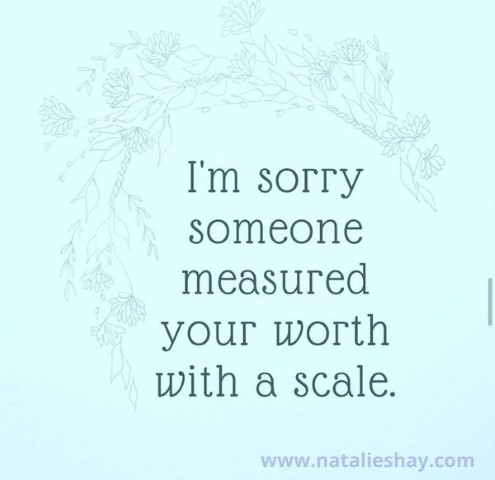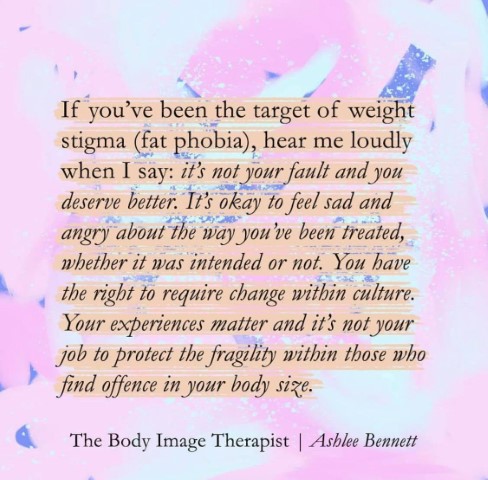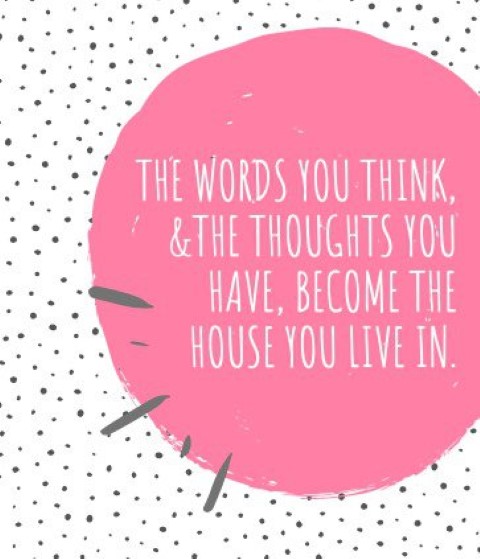Myth #19 You can shame people into losing weight
Myth #20 Fat shaming and fat-phobia aren’t a real problem
When I was 19, I had a job at Wholly Bagels. There was a woman that would come in every lunch time at 12:30 on the dot. She could barely fit through the doorway.
I used to dash away when I saw her coming. I would wash dishes, clean, clear plates – anything to not be the person to serve her. I was a size 12 and I was fat and disgusting. If I could do with skipping a meal or two, she clearly didn’t need to eat. I didn’t want to be the person enabling her.
I wish I could go back and apologise to that poor woman, knowing what I know now.

Fast-forward to the summer of 2015/2016. I was basically doing a triathlon every day, and living off of iced coffees. I lost quite a bit of weight, like I do when I actually knuckle down and change some stuff. I was feeling pretty amazing in the skin I was in.
I was cycling home from the pool one day, and a carload of guys stops at the lights beside me. One winds down the window, and yells “Your back tyre is about to pop!” I looked around with genuine concern. The whole car roared with laughter. The light changed, and they zoomed away.
Men are pigs.
The way they objectify women is just deplorable, isn’t it?
Women are worse.
That same summer we had some people over one night for a spa. Instead of the usual bikini situation, I wore my new bra – the lacey does-up-at-the-front-one – and bikini bottoms. I was feeling all sexy and amazing.
Two doors down, we could see other people in their backyard partying, so we waved them over.
The owner of this particular house had her own business as a personal trainer, and there were always women doing laps past our place to the power pole just further down the road, then heaving themselves back up the street as she yelled at them.
She was a stick-thin bean-pole sort that I doubt had ever put on a kilo in her life.
We were having a great ole time, listening to a Jessie J car party mix which included mandatory lip syncing and dancing on top of the apple crates. There’d been a few drinks, but we were just happily tipsy, joyful, living our best life.
We’d never met this neighbour before. Her friends seemed really nice, but she was quite standoffish, did not really join in with the merriment. We’d been dancing and singing away, and after about 5 minutes she just looks me up and down and says “Would you put some clothes on?”
“I’m sorry?” Clearly I’d heard her wrong, “We’ve just been in a spa…”
“People with bodies like you shouldn’t be dancing around in their underwear.”
I was so taken aback. I didn’t know what to say. She had the nerve to come to my house, and then say that to me?
Her friends ferried her drunk ass away shortly after that.
My body positivity bubble was certainly burst. She had no idea that I was inwardly celebrating shedding 5kg.
She just decided that I wasn’t thin enough.
What even is thin enough?
I have replayed that scene in my head so many times over, thinking of all the witty responses that I could have given her, but honestly, even now, I really just wish I’d given her a slap.
I think perhaps my zero-fucks-given approach sometimes rubs the more conscientious up the wrong way. It’s a radical act to love the skin you’re in, especially if it’s not perfect. It will attract hate from the insecure.

Easter 2019, we were redoing our lawns, I was out the front raking the grass seed back in. A lady walked past, and out of nowhere yells “Well, you’re fat aren’t ya?” A substantial size 18 at this stage, I couldn’t really deny it.
The best I could come up with from such an unsolicited judgement was “Well, you’re not very nice, are you?”
Good one, Lauren.

But seriously. What were these people hoping to achieve?
Did any of them think that it was
- Ok to say that
- Constructive
- That it would motivate change
- Do anything other than piss me off or make me think that they’re horrid human beings?
I suspect in all cases that it was a case of ‘If I stomp on someone else’s light, then mine will shine a little brighter’.
There’s something deeply gratifying about feeling better than someone else. I get that these people felt venerated because they were thinner than me, and in their eyes, better. That I embodied everything they’d been told was ‘unhealthy’ and ‘wrong’, and… ‘disgusting’.
When anyone speaks like that, it is never about the person that they’re speaking to, and always about themselves. Their values, their morals, their beliefs, their insecurities, what they believe to be true for them. They are just projecting onto you. It says much more about them than it does about you. Doesn’t mean it doesn’t hurt though.
It also screams that these people do not understand the basics in human psychology. People are not motivated by shame. Guilt is not the best driver for long lasting healthy change. It deeply concerns me that a personal trainer believes it is.
The problem with a culture that glorifies being thin, is that basically no one is ‘thin enough’. So then nearly everyone is up to be ridiculed.
The basics of human psychology dictate that if you are trying to motivate change, you focus on what you do want to see, not what you don’t want. It also works better to focus on the process, not the result.
However, is it others’ job to motivate change?
Because thin is so pervasive, because there’s an obesity epidemic, and because war has been declared on fat, some think it’s OK to cast aspersions on fat people – from social encounters to strangers in the street to the medical profession.

Pointing out to a fat person that they are fat is about as helpful as pointing out to a dwarf that they’re short.
There’s a 0% chance that they’ve forgotten, and it’s likely their life is punctuated by events and interactions that remind them of that fact daily. From job interviews, to dates. From clothes shopping, to putting on one’s shoes. From random comments from strangers, to ‘helpful’ comments from family, larger people are told in a thousand ways constantly that they do not fit, that they are not OK, that they shouldn’t be OK with the way they are – because no one else is.
I’m quite sure that none of my readers would ever do anything like that, but it is more than just hurling insults. Every time one of my friends that is smaller than me body shames themselves, or says that they need to lose weight, I immediately think things like ‘My goodness, she’s so beautiful, and if she thinks that tiny imperfection is a problem, imagine what she must really think about me!’

(…As if everyone’s thinking about me all the time.)
Obviously, I, as a larger human, can choose to accept the insults and compliments other people give me, or reject them. I can tout sayings like ‘Nobody can make you feel inferior without your consent‘ and ‘My self-worth is determined by myself, not others,’ all day long, but I’m not a robot. Other people’s words and actions have an impact, regardless of how much effort I’ve put into managing my thoughts about my self-worth.
It is a lot easier to reject fat shaming if you have accepted yourself.
It is a lot easier to reject fat shaming if you are secure in your body image.
It is a lot easier to reject fat shaming if it doesn’t happen in the first place.

So what can you do if you find yourself a victim of fat shaming?
Be kind to yourself. Have a bank of one line responses ready for your inner critic. I don’t know about you, but my inner critic just jumps on the band wagon, slaying me further if someone mentions my size. I find thoughts like ‘Other people’s opinion of me does not define my self-worth‘, ‘I am not my fat‘, ‘My worth is not determined by my size‘, ‘I have a human body‘, are all valid, more neutral thoughts.
So often we can let our self-worth be crushed by someone who’s opinion we don’t respect. Reclaim your self-worth. Your thoughts about you are infinitely more important than anyone else’s.

If it is in a medical scenario, come armed with information and studies, about how you can be healthy at any size. Your lifestyle now – not smoking, not drinking excessively, exercising and eating fresh fruit and vegetables – determine your blood pressure, cardiovascular health and overall health, much more than any BMI metric.
If it is a friend, try and tell them how you feel. If they don’t listen, perhaps they’re not really a friend worth keeping.
If it is a lover, same.
If it’s a family member, set a boundary. My body is not up for discussion. Each time it comes up, repeat your boundary.
Focus on what you are, not what you aren’t.

If you have a fat friend, try and be compassionate and accommodating. If you have body stuff (and don’t we all have body stuff) try and keep it to yourself, or perhaps find a different way to phrase it.

Try instead to create moments like this:

Further reading:
Kiwi doctor in training who is studying metabolism, explores fat shaming in medical community. Loads of problems go unresolved for fat people because Doctors can’t/won’t see past their fat.
Seems maybe the jury is out – guilt can be a motivator, shame seldom is.
It’s difficult to fund obesity treatments because “Research on attitudes carried out by IrSPEN in 2019, found that people with obesity are looked down on as lazy, over-indulgent, and deserving of what they get – and this prevents effective treatments from being publicly funded.”
😘